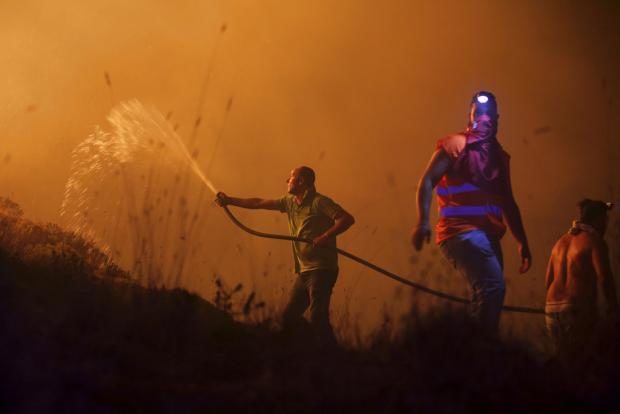
Volunteers use a water hose to fight a wild fire raging near houses in the outskirts of Obidos, Portugal, in the early hours of Monday, Oct. 16 2017. Dozens have now been confirmed dead as hundreds of forest fires spread across Portugal fueled by high temperatures, strong winds and a persistent drought. (FILE AP PHOTO / ARMANDO FRANCA)
At least 36 people have died in fires ravaging forests in northern and central Portugal over the past 24 hours while three people were reported killed in Spain in blazes sparked by arsonists and fanned by Hurricane Ophelia.
The 36 deaths, which included a one-month-old baby, were confirmed on Monday by Portugal’s national civil protection agency. This came four months after 64 people were killed in the deadliest fire in the country’s history in June.
“There are still places where security services have not yet managed to reach,” said civil protection agency spokeswoman Patricia Gaspar, adding that the toll remained preliminary for that reason.
She said seven people were still missing due to the fires, which have also injured at least 63 people, 16 of which were considered critical.
Gaspar also said that the 524 registered outbreaks of fire in Portugal – by far the most since 2006 – were caused by “higher than average temperatures for the season and the cumulative effect of drought.”
Portuguese Prime Minister Antonio Costa reaffirmed his pledges to prevent new tragedies by carrying out “fundamental reforms” in forest management and firefighting.
“After this year, nothing should remain as it was before,” he said.
In Portugal, as in the northwestern Spanish region of Galicia, temperatures were cooler on Monday and weather services forecast rain for Tuesday, even as about 3,600 firefighters were still battling some 30 major fires in Portugal by evening.
In Spain, Galician authorities have declared three days of regional mourning and said that there were still 15 active fires representing a risk to the population and homes.
‘End of the world’
One of the worst hit areas in Portugal is near the city of Lousa in the Coimbra region, where 650 firefighters were battling blazes.
“We went through absolute hell, it was horrible. There was fire everywhere,” a resident of the town of Penacova, near Lousa. told RTP television.
Two brothers in their 40s who were trying to put out the blaze there were among the fatalities.
In a village in the commune of Vouzela, in the northern district of Viseu, residents used water hoses to try to fight the flames as several homes were consumed.
“Everything happened in 45 minutes, the fire came at the foot of the village and spread at an incredible rate,” resident Jose Morais told AFP. “I had never seen anything like that before. It felt like the end of the world. Everyone fled”.
Fallen electricity pylons and abandoned cars were left lying in roads, the area surrounded by burnt pine and eucalyptus trees, as thick smoke clogged the sky.
“Most of the victims were killed in their cars, but we also found them inside their houses,” said the mayor of the town of Oliveira do Hospital, Jose Carlos Alexandrino, on public television RTP.
“The whole city looked like a ball of fire, surrounded by flames on all sides,” he said.
The Portuguese government said it had called on EU members and Morocco to help in the firefighting efforts, but so far only Italy had agreed to send two water bombers due to arrive in the evening.
Even before the latest blazes, nearly 216,000 hectares (530,000 acres) had been consumed by wildfires across the country between January and September, according to estimates from the country’s forest service.
‘Intentional fires’
In Galicia, on Spain’s border with Portugal, Prime Minister Mariano Rajoy blamed arsonists for most of the deadly wildfires, which have caused three deaths in the country.
“What we are experiencing here does not happen by chance, this was provoked,” he said after observing a minute’s silence for the victims in the town of Pazos de Borben.
Hundreds of firefighters backed by water-dropping helicopters and planes were battling 19 large wildfires in Galicia on Monday, the regional government said in a statement.
“Galicia is not burning by itself. Galicia is being burned,” said Alberto Nunez Feijoo, head of the regional government, blaming “terrorist arsonists”.
Five wildfires near Vigo, Galicia’s biggest city, forced the evacuation of a shopping mall and a Peugeot Citroen car factory on the outskirts of the city, though workers were able to return to the factory on Monday.
The city of around 300,000 residents has opened up two sports centers and booked rooms in three hotels for people who had to evacuate their homes.
Schools shut
Two women died on Sunday after being engulfed in flames trapped in their van near Nigran, outside Vigo, and an elderly man died in an animal shed near his house in Carballeda de Avia.
Hurricane Ophelia swept past Spain before being downgraded to a violent storm on Monday as it battered Ireland.
Meteorologists said Ophelia was the most powerful hurricane recorded so far east in the Atlantic and the first since 1939 to travel so far north. /kga